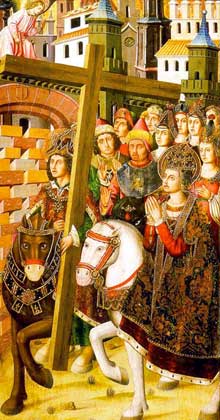
I read this novel by Evelyn Waugh in one day. It's a very short book and rather a strange one. But a very good one it is in my opinion. Centering around the legend of St. Helena's discovery of the true Cross, its tone is oddly detatched, like the tone of a fairy tale. It doesn't delve into it's characters' personalities, but delineates them with the utmost brevity - a line or two sufficing to express many of the characters. Important events are only briefly touched upon before the book skips to the next scene, which often takes place years later.
In brief, it's a model of brevity. Whether you are more fond of Victor Hugo's wandering style (remember the innumerable essays on the Battle of Waterloo tossed into the middle of "Les Miserables"?) or, like me, enjoy a happy medium of the Dostoevskian type, you have to admit that Waugh pulls this brevity off remarkably well. I came away from the book with a very definite sense that I had read a book. Not some shoddy attempt at a book thrown together with not enough development. The "lack" of development here is studied and is harmonious with the tone produced throughout the book.
On to the theme of the book. (What an absurd practice it is to always dissect books for themes. I rather think the story is what counts in the end. Nevertheless, a good understanding of the theme - I cringe at the word - does help me enjoy the story a little more.) Waugh has plenty of enjoyable comments and memorable quotes about a variety of subjects: power, society, etc. I think the two most definite points the book centers around, however, are the relationship between temporal power and the power of religion, and the solid reality of Christianity as opposed to the myriad of cults and sects around around the time of the Roman Empire's decline.
The former "theme" plays a larger part in the first chapters of the book than in the last. You see the ancestral pride of Helena's father, the old British chieftan and his resulting disregard for Constantius' Imperial lineage. "Apart from their divinity, who were they? Some of the emperors we've had lately, you know, have been - very literally - nothing to make a song about." You see Constantius' obsessive fixation with his claims to power, the resulting destruction of his amiable qualities, and his thoughtless discarding of Helena for a more politically advantageous wife. You watch Constantine and his wife Fausta carry on their own machinations, their more direct attempts to control the Church. Helena responds by simply and quietly becoming a saint. And as a saint, she pinpoints the tragedy of all this power grabbing: "Think", she says "of the misery of a whole world possessed of Power without Grace."
In Imperial Rome, in high society, religion is a mishmash of cultic ritual, of esoteric "answers", of confusing and contradictory pseudo-philosophy. Only Christianity is different. This difference is something which Helena comprehends, but which Constantine and Fausta do not. They view Christiaity as being on the level with any other cultic religion of the day. What the latter do not see is that the similarities between Christianity and these popular religions ends with the simple fact that both have ritual and mysteries. In Christianity alone do these rituals and mysteries have substance. The Gnostics in the book pour out empty sentences in profusion when preaching, but nothing is ever really said in their lectures because the Gnostics believe (essentially) that nothing is real but their own abstract ideas.
For Christians there is the Incarnation. The world is real to Christians. Helena grasps this and takes as her vocation a quest to find the true Cross of Christ. Others like Eusebius and Constantine spend their time in Theological arguments - a similarity to the Gnostics and others which is too pronounced to be missed. (I don't know whether Waugh was meaning to condemn Constantine and Eusebius and concern with minute points of theology. I rather think that he wasn't. It's a literary device in the book which gets his point across without seriously attacking Catholic theology.) Constantine, in a surge of high enthusiam about his theoretical version of Christianity puts down Rome to the Pope's face with the words, "You can have your old Rome, Holy Father, with its Peter and Paul and its tunnels full of martyrs. We start with no unpleasant associations; in innocence, with Divine Wisdom and Peace."
But for Helena their is no rejection of the intrinsic reality of Christianity and of the pain and suffering often involved without there being a rejection of Christ Himself. "Just at this moment when everyone is forgetting it and chattering about the hypostatic union, there's a solid chunk of wood waiting for them to have their silly heads knocked against. I'm going out to find it."
No comments:
Post a Comment